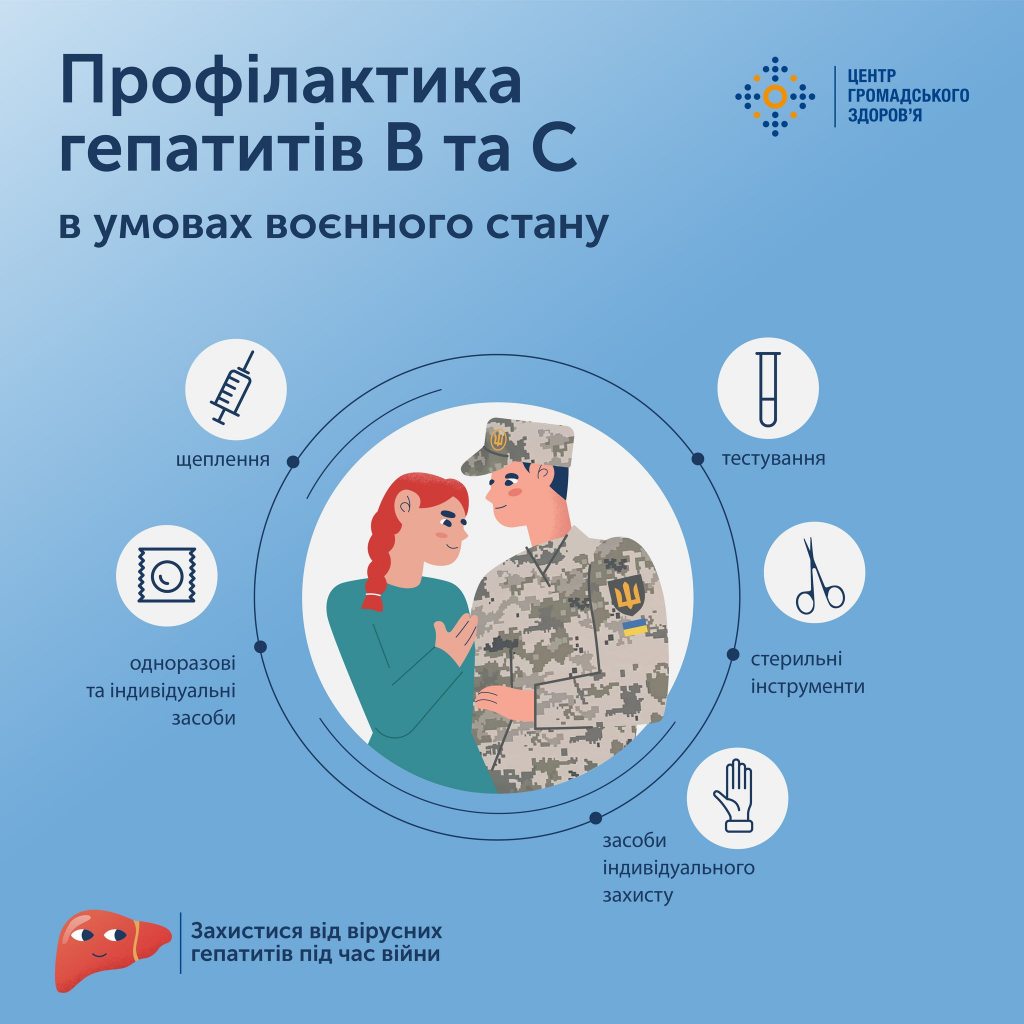
July 28 is World Hepatitis Day, which aims to raise awareness of the ways in which hepatitis is transmitted.
The most common ways of transmission:
- unsafe medical and other manipulations involving contact with blood (tattoos, piercings, manicures, etc.)
- use of unsterilized household and professional devices after an infected person (brushes, nail scissors, razors, etc.);
- use of non-sterile injection equipment for drug use;
- during transfusion of blood and its components.
The State Institution “MIA of Ukraine in Kirovohrad Oblast” ensured the quality of medical services to patients in compliance with safety measures to prevent infection with infectious diseases, which allows providing safe medical care to all patients who need it.
Infection safety requirements are met at each workplace on a daily basis.
Medical workers of the hospital (with a polyclinic) from the high-risk group of infection:
- are vaccinated against hepatitis B - the best and most effective way to prevent hepatitis B infection;
- undergo annual screening for hepatitis;
- are aware of the procedure for dealing with accidents with biological fluids, including blood;
- comply with the requirements for medical waste management;
- use sterile instruments and equipment;
- are provided with sufficient personal protective equipment.

The hospital laboratory (with a polyclinic) offers tests (rapid testing) to detect antigen to the most dangerous viral hepatitis B and C. As of 01.07.2024, 1516 tests were conducted, of which 15 results were positive for hepatitis C and 14 for hepatitis B.
Most infected people are unaware of their disease, so they do not start timely treatment. Protect yourself and your family from viral hepatitis!
Consult a doctor in time who will advise you and, if necessary, refer you for further examination. You can make an appointment with a doctor in advance:
(0522) 55-70-66
050-539-46-99
https://cabinet-health.mvs.gov.ua/login/
Prevention of viral hepatitis B and C https://phc.org.ua/news/profilaktika-virusnikh-gepatitiv-v-i-s-pid-chas-viyni
Injuries, untested blood transfusions and sexual violence, which, unfortunately, have been taking place in Ukraine since the beginning of the full-scale invasion of the Russian army, increase the risk of infection with viral hepatitis B and C.
Unprotected sexual intercourse, especially when accompanied by violence, condom damage or slipping, increases the risk of infection due to its traumatic nature.
We are also talking about other risky situations, including contacts during professional activities: medical workers, military personnel, and rescuers may be injured or come into contact with blood and other biological fluids of people with unknown infection status.
Also, the number of surgical interventions is increasing and they may not always be provided in appropriate conditions, which can lead to an increased risk of viral hepatitis infection.

Prevention of viral hepatitis during the war is complicated by the fact that the fighting is still ongoing, and therefore situations where the risk of infection is increased are repeated. Therefore, the Center for Public Health calls for:
- Get vaccinated against hepatitis B. It is believed that a three- or four-dose vaccination regimen is optimal. After a full series of vaccination, more than 95% of infants, children of other age groups, and young adults develop protective levels of antibodies. Protection lasts for at least 20 years and probably for life. That is why the WHO does not recommend revaccination of people who have fully completed the three-dose vaccination regimen.
- Use single-use (syringes, needles, drip systems, gynecological examination mirrors, etc.) and individual (toothbrushes, razor blades, contact lenses) products;
- Use of personal protective equipment (gloves, goggles, aprons, etc.);
- Use reusable sterile instruments (manicure, dental, surgical, laboratory, piercing, tattooing, etc.).
- Practice safe and protected sex (using barrier contraception).
Be sure to get tested, and in case of a positive result, seek treatment.
